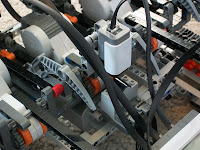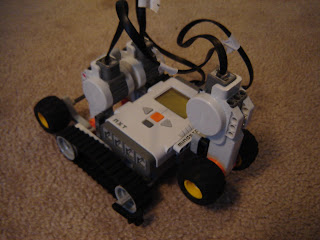Playing field overview
In the center of the field is an obstacle. This obstacle should be a large book or a Lego plateau of similar shape. It should be about 1.25 inches (3 cm) tall and at least 8 inches (20 cm) long in the direction of the playing field's "line". The width from side to side doesn't matter much because there will be penalties for going around the obstacle. As long as it is wide enough for your robot to easily cross over there should be no problem.
Obstacle examples
Plateaus are difficult to construct out of Lego, but here's an inside view of how I made mine. The smaller baseplate is supported by several small Lego towers and held down at the corners.
Lego obstacle inside view
On one side of the obstacle is a triangular stack 15 of Lego cubes. These cubes must be made of Lego pieces, and they must have the exact dimensions 4 studs long by 4 studs wide by 3 bricks tall (approximately 4 studs cubed). The cubes are the scoring elements, so the object of the game is to put them into the goal.
A cube
A stack of 15 cubes
The goal is composed of an empty Kleenex box with the plastic removed or a Lego box of similar dimensions. If necessary, you could make a simulated Kleenex box out of cardboard. Kleenex boxes are approximately 4.5 inches (11.5 cm) wide by 8.75 inches (22 cm) long 3.5 inches (9 cm) tall with a hole 2 inches (5 cm) wide by 7 inches (18 cm) long in the center of the top. My Lego version is 30 studs by 16 studs by 9.33 bricks with a 6 stud by 22 stud hole. Note that my Lego version has no bottom. It shouldn't get flipped over during play so no bottom is necessary.
Goals
Now that you know what the playing field looks like, feel free to make one of your own and start testing prototypes. The full rules for the competition should be out sometime in January. I'm leaving for a week starting at 6 am on New Years Day (ughhhhh), so I won't be working on this for a while.



































































